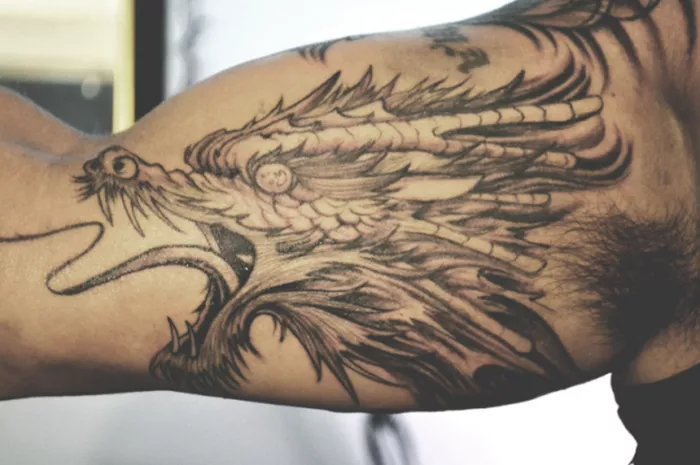In recent years, dragon tattoos have become increasingly popular, adorning the skin of individuals worldwide. These intricate designs captivate with their mythical allure and symbolic richness. Yet, amidst the modern fascination, a pertinent question arises: Are dragon tattoos traditional? Delving into the depths of history and culture unveils a narrative that spans continents and epochs, revealing the nuanced significance of dragon imagery across various civilizations.
Origins of Dragon Symbolism
To comprehend the tradition behind dragon tattoos, it’s imperative to delve into the origins of dragon symbolism. Across diverse cultures, dragons have held multifaceted meanings, often embodying both benevolent and malevolent forces. In Chinese mythology, dragons symbolize power, strength, and good fortune. They are revered as divine creatures associated with the elements and revered as symbols of imperial authority. The celestial dragon, for instance, represents the emperor, while the dragon dance remains a cornerstone of Chinese New Year celebrations, signifying prosperity and warding off evil spirits.
Similarly, in Japanese culture, dragons occupy a revered place, albeit with distinct interpretations. Here, dragons are associated with water and are believed to bring rainfall, essential for agriculture and prosperity. Japanese dragon mythology also encompasses the legend of the dragon slayer, symbolizing courage and triumph over adversity.
In contrast, Western depictions of dragons often portray them as fearsome beasts, embodiments of chaos and destruction. From the fire-breathing dragons of European folklore to the serpentine creatures of Norse mythology, Western cultures have long held a complex relationship with these mythical beings, oscillating between awe and fear.
Evolution of Dragon Tattoos
The practice of tattooing dates back thousands of years, with evidence of tattooed individuals found in ancient civilizations such as Egypt, Greece, and Polynesia. However, the specific association of dragons with tattoos emerged in the cultural milieu of East Asia.
In traditional Japanese tattooing, known as irezumi, dragons hold a prominent place. These elaborate designs, rendered with meticulous detail, symbolize strength, wisdom, and protection. Irezumi masters, or horishi, craft these tattoos using a method that blends artistry with spiritual significance. Each element of the dragon’s portrayal carries symbolic weight, from the number of claws to the direction of its gaze, imbuing the tattoo with layers of meaning.
Similarly, in Chinese tattoo culture, dragon motifs have a rich history. Historically, these tattoos were reserved for the elite, symbolizing nobility and status. Emperors and warriors adorned themselves with dragon tattoos to invoke the creature’s mythical attributes and instill fear in their adversaries. Over time, the practice spread beyond the aristocracy, becoming increasingly accessible to the general populace.
Contemporary Perspectives on Dragon Tattoos
In the modern era, dragon tattoos continue to hold sway, albeit with evolving interpretations. For many, these designs serve as expressions of personal identity and aesthetic preference. The intricate patterns and vibrant colors of dragon tattoos captivate the eye, making them a popular choice among tattoo enthusiasts seeking bold and striking designs.
Moreover, dragon tattoos often carry deeper significance for those who choose to adorn their bodies with these mythical creatures. For some, dragons represent resilience and the ability to overcome challenges, serving as reminders of inner strength and determination. Others view dragon tattoos as talismans for protection or symbols of spiritual growth and transformation.
However, it’s essential to recognize that the meaning of dragon tattoos can vary widely depending on cultural context and individual interpretation. While some may embrace these designs for their historical and cultural significance, others may simply appreciate them for their aesthetic appeal, divorced from any deeper symbolism.
Navigating Cultural Sensitivity
As dragon tattoos gain popularity in mainstream culture, it’s crucial to approach their portrayal with sensitivity and respect for their cultural origins. Appropriation of sacred symbols without understanding their cultural significance can perpetuate stereotypes and diminish their cultural heritage.
Individuals considering a dragon tattoo should take the time to learn about its cultural significance and engage with artists who have a deep appreciation for the tradition behind the design. Moreover, cultural exchange should be approached with humility and a willingness to listen and learn from diverse perspectives.
In conclusion, dragon tattoos have deep roots in traditional cultures, spanning centuries of myth and legend. From the majestic dragons of East Asian folklore to the fearsome creatures of Western mythology, these designs carry layers of symbolism and meaning. Whether as symbols of power, protection, or personal transformation, dragon tattoos continue to captivate the imagination and serve as timeless expressions of human creativity and resilience. However, as we embrace these symbols in contemporary tattoo culture, let us do so with reverence for their cultural heritage and a commitment to fostering understanding and appreciation across borders and generations.

